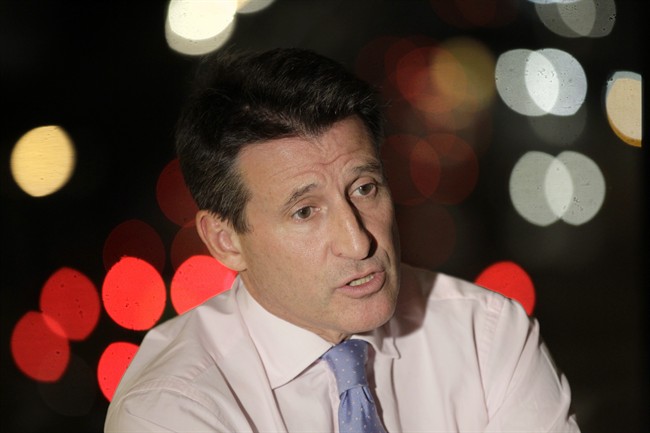LONDON – The current doping crisis engulfing track and field is as damaging to the sport as the scandals involving Ben Johnson and Marion Jones, IAAF vice-president Sebastian Coe said Sunday.

“In the 40 or so years in athletics, there have been big moments. Ben Johnson in 1988, Marion Jones, this is up there and nobody is remotely suggesting these allegations are not serious,” the British middle-distance great told the BBC.
The sport’s governing body is investigating allegations by a German TV station of a coverup of systematic doping in Russia. Two IAAF officials have stepped down while the investigation takes place.
READ MORE: Ben Johnson brings crowd to its feet in first race in decades
“It’s been described as a bad week for athletics,” said Coe, who recently declared his candidacy to become president of the IAAF. “I would go further, it’s been a ghastly week. None of us should hide or shy away from that. We have to bring this tawdry, sorry episode and any of those allegations to a close as quickly as we can.”
Johnson failed a doping test after winning the 100 metres at the Seoul Olympics in 1988. Jones was stripped of five Olympic gold medals in 2007 after admitting to using performance-enhancing drugs in her career.
ARD TV station also claimed the IAAF did not probe 150 suspect blood samples from 2006 to 2009. The sport’s governing body answered earlier this week that it launched its biological passport only in 2009 and therefore could only use the data collected earlier for target purposes.
“One cannot draw any conclusion on whether or not an athlete has doped on the basis of one single blood value,” the IAAF said.
“The whole concept of the (biological passport) is to monitor the variations of an athlete’s profile consisting of multiple values.”
Coe said he is not aware of the list and asked the German station to provide more information about it.
“The simple answer is I don’t know, the IAAF does not know what this list contains and whether it is a list that has any veracity at all,” said Coe. “The offer we make as a federation is, if there is more information out there, if this German journalist feels there is a list, or whatever he’s got, please let us know what it is.”
The IAAF and the World Anti-Doping Agency (WADA) have both launched investigations after the German program also appeared to show reigning Olympic 800-meter champion Maria Savinova admitting to using the banned steroid oxandrolone. Three-time Chicago Marathon winner Liliya Shobukhova was also reported to have paid 450,000 euros ($560,000) to avoid a doping ban. Shobukhova was eventually banned for doping and she said some of the money was refunded.
Earlier this week, the son of IAAF President Lamine Diack has suspended his work as a marketing consultant for the track and field body pending the IAAF investigation. The move was announced a day after IAAF treasurer and council member Valentin Balakhnichev relieved himself of his duties while the investigation by the IAAF ethics commission is continuing.



Comments